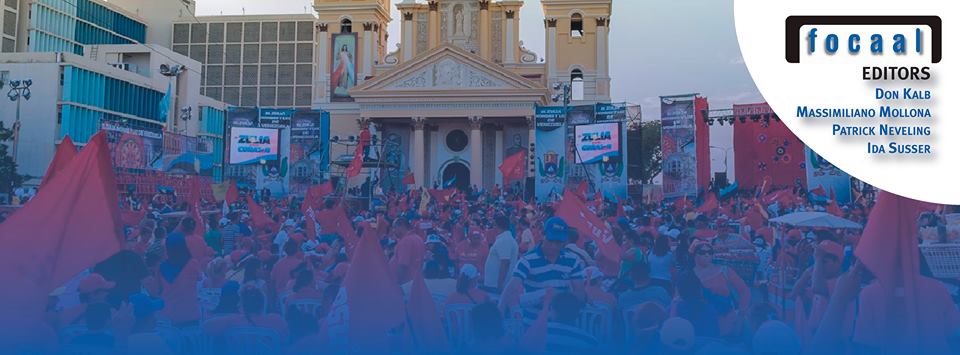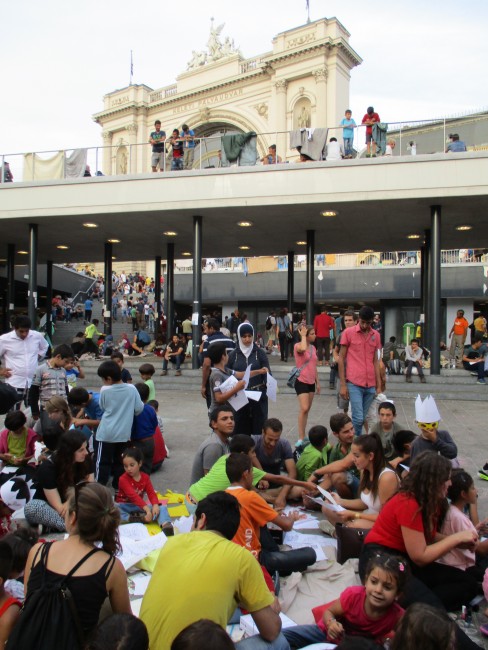The mode of production (MoP) was an important term in the Marxist anthropology of the 1970s. Its origins can be traced to the diverse uses of the words by Marx himself, to elaborations on this by Louis Althusser and Étienne Balibar (for an excellent overview, see Resch 1992), and to contributions from various French Africanist scholars. It was part of a wider conceptual vocabulary—about “articulation,” “social reproduction,” and “social formations”—that underpinned a number of innovative works in history and anthropology (Anderson 1974; Rey 1971; Wolf 1982).
Continue reading
David Bozzini: Gabriella Coleman on the ethnography of digital politics – part 2
David Bozzini is a research fellow at the Graduate Center, CUNY, where he is researching on Eritrean deserters movements and on the resistance to digital surveillance. He co-edits Tsantsa, the journal of the Swiss Ethnological Society.
Gabriella Coleman is an anthropologist and holds the Wolfe Chair in Scientific and Technological Literacy at McGill University in Montreal, Canada. She wrote about the free software movement in her book Coding Freedom: The Ethics and Aesthetic of Hacking. After years of researching Anonymous and following its online discussions and debates, she published Hacker, Hoaxer, Whistleblower, Spy: The Many Faces of Anonymous (Verso, 2014).
David Bozzini: Gabriella Coleman on the ethnography of digital politics – part 1
David Bozzini is a research fellow at the Graduate Center, CUNY, where he is researching on Eritrean deserters movements and on the resistance to digital surveillance. He co-edits Tsantsa, the journal of the Swiss Ethnological Society.
Gabriella Coleman is an anthropologist and holds the Wolfe Chair in Scientific and Technological Literacy at McGill University in Montreal, Canada. She wrote about the free software movement in her book Coding Freedom: The Ethics and Aesthetic of Hacking. After years of researching Anonymous and following its online discussions and debates, she published Hacker, Hoaxer, Whistleblower, Spy: The Many Faces of Anonymous (Verso, 2014).
Prem Kumar Rajaram: Beyond crisis: Rethinking the population movements at Europe’s border
This post is part of a series on migration and the refugee crisis moderated and edited by Prem Kumar Rajaram (Central European University).
Crisis
The refugee crisis in Europe is fabricated. Like most “crises,” the recent onset of people from Syria, Iraq, Afghanistan, Bangladesh, and Pakistan trying to cross into the European Union is a representation. Anxiety and specific readings of law and humanitarianism frame this issue. This framing works inward as well as outward. Inward, it establishes a dominant regulating norm—an idea of “the refugee”—that allows for internal comparison and inequalities (people are said to have varying rights to protection). Outward, the framing helps create an understanding of a complex situation—an abstracted understanding—and allows for policy makers and commentators to treat “the refugee crisis” as an exceptional condition. As exception, that crisis appears to be regarded and treated as an “event” distinct from the political “norm,” and it enables a vertical form of politics. The crisis is the state acting as it tends to, as a protection racket in Charles Tilly’s memorable take, defining a danger or threat that strengthens its force and its hold over territory.
Continue reading
Stef Jansen: Yearnings in the meantime
“Normal lives” and the state in a Sarajevo apartment complex
Yearnings in the Meantime is a volume of the “Dislocations” series published by Berghahn Books. The immense dislocations and suffering caused by neo-liberal globalization, the retreat of the welfare state in the last decades of the twentieth century, and the heightened military imperialism at the turn of the twenty-first century have raised urgent questions about the temporal and spatial dimensions of power. Through stimulating critical perspectives and new and cross-disciplinary frameworks, which reflect recent innovations in the social and human sciences, this series provides a forum for politically engaged, ethnographically informed, and theoretically incisive responses.
Continue reading
FocaalBlog on Facebook!
Can’t get enough FocaalBlog? Like us on Facebook!
Stay up to date on the latest FocaalBlog posts, interviews, forums, events, and special features. Plus, get insights into the latest discussions and discoveries in the anthropological world and beyond through topical articles and scholarly resources.
Be a part of the anthropological conversation!
Mallika Shakya: Ethnicity in Nepal’s new constitution
From politics of culture to politics of justice
Nepal promulgated its constitution on 20 September—the first after ending the monarchy, and one replacing the interim constitution in place since 2007. That interim constitution had been put in place to mark the peace agreement with the Nepali Maoists, mainstreaming them into democratic politics and unarming them under the UN mediation. While there were other obstacles in finalizing the constitution, the hardest nut to crack has been the issue of federalism because it involved finding a way to work Nepal’s multiple ethnic and regional identities into the mono-ethnic nationalism institutionalized by the state thus far.
Continue reading
Zoltán Glück: Of politics and crowds: A conversation with Susan Buck-Morss
This interview with Susan Buck-Morss took place at the City University of New York (CUNY) Graduate Center on May 12 2015. Buck-Morss is Distinguished Professor of Political Philosophy at the Graduate Center and has been a towering figure in continental theory since her publication of The Origin of Negative Dialectics in 1977. Her books include Hegel, Haiti, and Universal History (2009), Thinking Past Terror: Islamism and Critical Theory on the Left (2003), Dreamworld and Catastrophe: The Passing of Mass Utopia in East and West (2000), and The Dialectics of Seeing: Walter Benjamin and the Arcades Project (1991). In this interview with Zoltán Glück for FocaalBlog, Professor Buck-Morss talks about her formative years of political radicalization, the difficulties of teaching the radical tradition, and the political significance of crowds.
Continue reading
Chris Hann: The new Völkerwanderungen: Hungary and Germany, Europe and Eurasia
I spent the last weeks of August and the first days of September in Hungary, close to the European Union’s border with Serbia. Never before had a routine field trip catapulted me into an engagement with issues dominating daily headlines, both in Hungary and elsewhere. What light can social anthropology throw on the current “migrant crisis”?
Continue reading
FocaalBlog Event: CUNY Panel Discussion on Puerto Rico’s Debt Crisis
On Tuesday, September 8, the City University of New York (CUNY) Center for Latin American, Caribbean, and Latino Studies is hosting a free panel discussion and presentation based on the recent FocaalBlog post “Puerto Rico Is NOT Greece: Notes on the Role of Debt in US Colonialism.”
Where: The Graduate Center
365 Fifth Avenue
Room 9100: Skylight Room
When: September 8, 6:30–8:30 p.m.
Contact Info: 212-817-8434
The blog authors Ismael García-Colón, Associate Professor of Anthropology at the College of Staten Island and the CUNY Graduate Center, and Harry Franqui-Rivera, Research Associate at Hunter College’s Center for Puerto Rican Studies, will participate in the discussion.
For more details, please visit the event page here.

